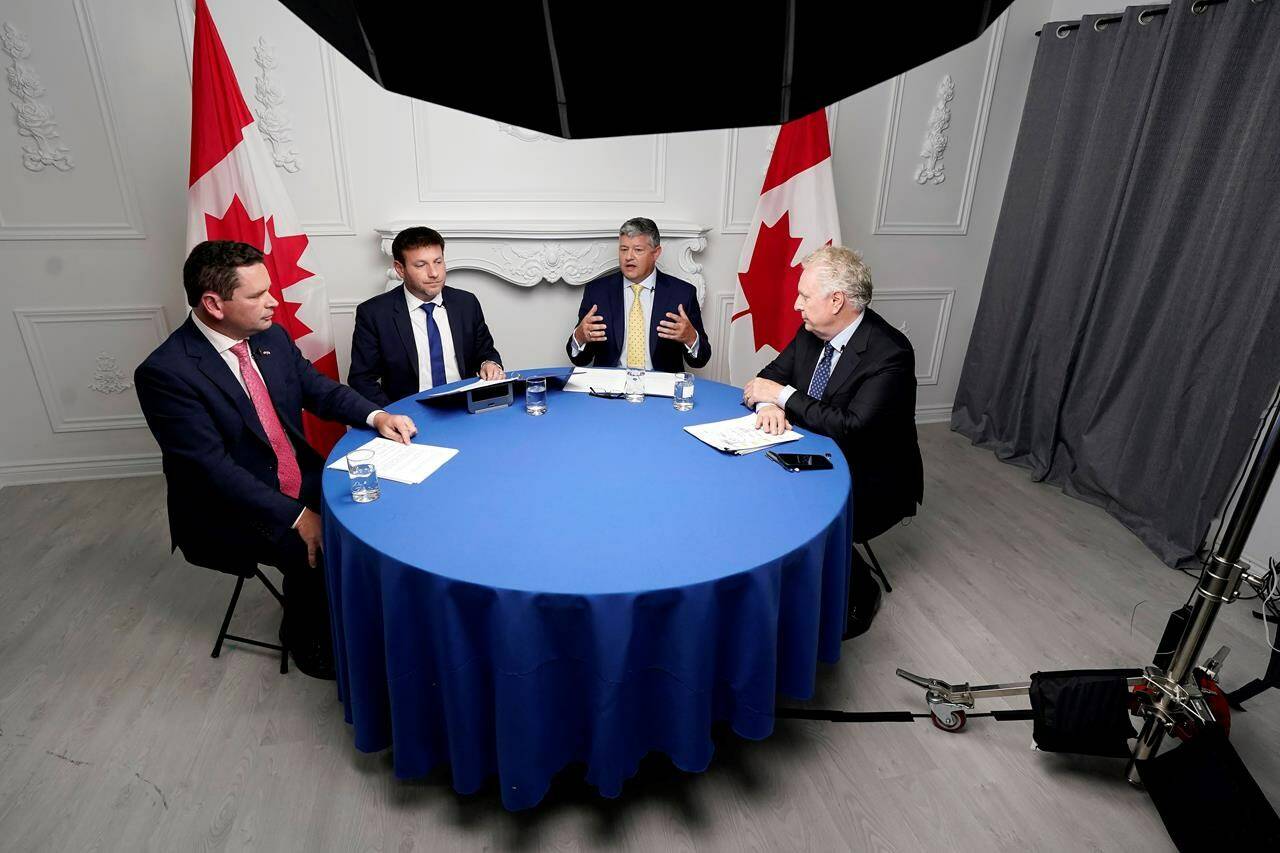Jean Charest spent the last official debate of the federal Conservative leadership race on Wednesday making the case for his experience as a political leader being what the party needs to unite, with six weeks left in the contest.
Rural Ontario MP Scott Aitchison and Roman Baber, a former Ontario legislator whom Doug Ford booted from caucus over opposing COVID-19 lockdowns, also said that if the Conservatives hope to defeat the Liberals, every candidate in the race must commit to coming together after the new leader is picked Sept. 10.
Charest, a former Quebec premier had pressed the party to hold a third leadership debate. During the event, without naming names, chided the decision by others in the race to skip the debate.
“If we are going to unite the party, you have to show up,” he said.
Pierre Poilievre, Charest’s main rival in the race, spent the evening campaigning in Saskatchewan.
Charest said a candidate not showing up for leadership debate “is like a fish who says he doesn’t wan to swim in the ocean.”
Poilievre, the perceived front-runner in the race, along with Leslyn Lewis, a rookie MP who placed third in the party’s 2020 leadership race, both chose not to participate.
They had both said Wednesday’s debate in Ottawa as unnecessary and badly timed for campaigns trying to get their supporters and other party members to fill out and mail in their ballots.
Under party rules, Poilievre and Lewis are set to be fined $50,000 for skipping the event. Although party rules say the fine for any candidate who decides to skip an official debate is automatic, the party’s leadership election organizing committee will have the final say.
Charest disagreed with their argument that the debate was not needed.
During the debate, he said a majority of the nearly 670,000 members in the party have yet to send in their ballots, suggesting they are still making up their minds.
As of Wednesday afternoon, the party reported 150,000 ballots have been returned.
The three candidates who showed up for the debate began by reflecting on what they had heard from Canadians and party members during the contest, which began after the Conservative caucus voted to oust former leader Erin O’Toole from the top job.
Charest pitched himself as the only candidate who could change the party’s record of losing consecutive federal elections to the Liberals, led by Prime Minister Justin Trudeau.
“You have had enough of losing,” said Charest.
Baber said he would continue to stand up for Canadians affected by COVID-19 vaccine mandates. He also stressed that he is not afraid to stand up for his values, including against the Liberal’s climate agenda.
At one point, he said to deal with climate change he would look to increase the amount of trees planted annually in the country.
“I love trees,” he said.
Aitchison, who throughout the race has struck an optimistic tone, said he believes Canada can keep its commitment to reach net-zero emissions while cancelling the national carbon price, which is a favourite rallying cry among party faithful.
Charest pledged to get rid of the federal price on consumer goods while imposing a levy on the heaviest of emitters.
He said the party must present a credible climate plan if it hopes to win the chance at government and highlighted his experience developing climate plans as Quebec’s premier.
“A slogan is not a climate plan,” said Charest, who was federal environment minister under Progressive Conservative prime minister Brian Mulroney. He later led that party.
The English-language portion of the debate, which took up the first 45 minutes, featured more friendly discussion than sparring between candidates.
The room was small, without the usual audience or even screens, and the three candidates joined the moderator, party president Rob Batherson, around a small table in a cramped room.
Before the debate began, Charest described the setup as “bizarre,” adding: “I’ve never seen anything like this.”
Besides fielding questions on fighting climate change, they also spoke about fixing travel in Canada and advancing reconciliation with Indigenous Peoples.
Batherson told candidates and viewers “we don’t have any sad trombones in this debate.”
He was referring to sound effects used during the official English-language debate in May, which many party members, including Poilievre, heavily criticized.
Stephanie Taylor, The Canadian Press
READ ALSO: Patrick Brown fights back after barred from Conservative leadership race

